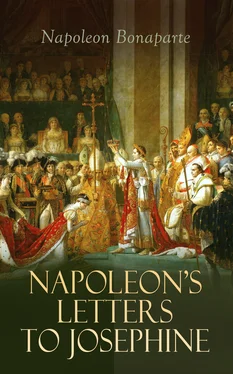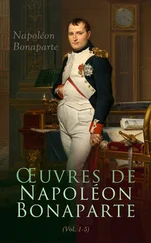"We have found it necessary to have the spelling of names of places and of persons frequently altered, but we have allowed to remain slight incorrectnesses of language which denote the impetuosity of composition, and which often could not be rectified without weakening the originality of an energetic style running right to its object, brief and precise as the words of command. Some concise notes necessary for clearing up obscure passages are the sole conditions which we have allowed ourselves....
"The Commission has decided in favour of chronological order throughout. It is, moreover, the only one which can reproduce faithfully the sequence of the Emperor's thoughts. It is also the best for putting in relief his universal aptitude and his marvellous fecundity.
"Napoleon wrote little with his own hand; nearly all the items of his correspondence were dictated to his secretaries, to his aides-de-camp and his chief of staff, or to his ministers. Thus the Commission has not hesitated to comprise in this collection a great number of items which, although bearing another signature, evidently emanate from Napoleon....
"By declaring that his public life dated from the siege of Toulon, Napoleon has himself determined the point of departure which the Commission should choose. It is from this immortal date that commences the present publication.
"(Signed) The Members of the Commission.
" Paris, January 20, 1858. "
Contemporary Sources.—It is a commonplace that the history of Napoleon has yet to be written. His contemporaries were stunned or overwhelmed by the whirlwind of his glory; the next generation was blinded by meteoric fragments of his "system," which glowed with impotent heat as they fell through an alien atmosphere into oblivion. Such were the Bourriennes, the Jominis, the Talleyrands, and other traitors of that ilk. But
"The tumult and the shouting dies;
The captains and the kings depart;"
and now, when all the lesser tumults and lesser men have passed away, each new century will, as Lockhart foretold, "inscribe one mighty era with the majestic name of Napoleon." And yet the writings of no contemporary can be ignored; neither Alison nor Scott, certainly not Bignon, Montgaillard, Pelet, Mathieu Dumas, and Pasquier. Constant, Bausset, Méneval, Rovigo, and D'Abrantès are full of interest for their personal details, and D'Avrillon, Las Cases, Marmont, Marbot, and Lejeune only a degree less so. Jung's Memoirs of Lucien are invaluable, and those of Joseph and Louis Bonaparte useful. But the Correspondence is worth everything else, including Panckouke (1796-99), where, in spite of shocking arrangement, print, and paper, we get the replies as well as the letters. The Biographie Universelle Michaud is hostile, except the interesting footnotes of Bégin. It must, however, be read. The article in the Encyclopædia Britannica was the work of an avowed enemy of the Napoleonic system, the editor of the Life and Times of Stein .
For the Diary, the Revue Chronologique de l'Histoire de France or Montgaillard (1823) has been heavily drawn upon, especially for the later years, but wherever practicable the dates have been verified from the Correspondence and bulletins of the day. On the whole, the records of respective losses in the battles are slightly favourable to the French, as their figures have been usually taken; always, however, the maximum French loss and the minimum of the allies is recorded, when unverified from other sources.
The late Professor Seeley, in his monograph, asserts that Napoleon, tried by his plan, is a failure—that even before death his words and actions merited no monument. We must seek, however, for the mightiest heritage of Napoleon in his brainchildren of the second generation, the Genii of the Code.
The Code Napoleon claims to-day its two hundred million subjects. "The Law should be clean, precise, uniform; to interpret is to corrupt it." So ruled the Emperor; and now, a century later, Archbishop Temple (born in one distant island the year Napoleon died in another) bears testimony to the beneficent sway of Napoleon's Word-Empire. Criticising English legal phraseology, the Archbishop of Canterbury said, "The French Code is always welcome in every country where it has been introduced; and where people have once got hold of it, they are unwilling to have it changed for any other, because it is a marvel of clearness ." Surely if ever Style is the Man, it is Napoleon, otherwise the inspection of over seven million words, as marshalled forth in his Correspondence , would not only confuse but confound. As it is, its "hum of armies, gathering rank on rank," has left behind what Bacon calls a conflation of sound, from which, however, as from Kipling's steel-sinewed symphony,
"The clanging chorus goes—
Law, Order, Duty and Restraint, Obedience,
Discipline."
NAPOLEON'S LETTERS
Table of Contents
(1796)
February 23rd.—Bonaparte made Commander-in-Chief of the Army of Italy.
No. 1.
Seven o'clock in the morning.
My waking thoughts are all of thee. Your portrait and the remembrance of last night's delirium have robbed my senses of repose. Sweet and incomparable Josephine, what an extraordinary influence you have over my heart. Are you vexed? do I see you sad? are you ill at ease? My soul is broken with grief, and there is no rest for your lover. But is there more for me when, delivering ourselves up to the deep feelings which master me, I breathe out upon your lips, upon your heart, a flame which burns me up—ah, it was this past night I realised that your portrait was not you. You start at noon; I shall see you in three hours. Meanwhile, mio dolce amor , accept a thousand kisses,14 but give me none, for they fire my blood.
N. B.
A Madame Beauharnais.
March 9th.—Bonaparte marries Josephine. March 11th.—Bonaparte leaves Paris to join his army.
No. 2.
Chanceaux Post House, March 14, 1796.
I wrote you at Chatillon, and sent you a power of attorney to enable you to receive various sums of money in course of remittance to me. Every moment separates me further from you, my beloved, and every moment I have less energy to exist so far from you. You are the constant object of my thoughts; I exhaust my imagination in thinking of what you are doing. If I see you unhappy, my heart is torn, and my grief grows greater. If you are gay and lively among your friends (male and female), I reproach you with having so soon forgotten the sorrowful separation three days ago; thence you must be fickle, and henceforward stirred by no deep emotions. So you see I am not easy to satisfy; but, my dear, I have quite different sensations when I fear that your health may be affected, or that you have cause to be annoyed; then I regret the haste with which I was separated from my darling. I feel, in fact, that your natural kindness of heart exists no longer for me, and it is only when I am quite sure you are not vexed that I am satisfied. If I were asked how I slept, I feel that before replying I should have to get a message to tell me that you had had a good night. The ailments, the passions of men influence me only when I imagine they may reach you, my dear. May my good genius, which has always preserved me in the midst of great dangers, surround you, enfold you, while I will face my fate unguarded. Ah! be not gay, but a trifle melancholy; and especially may your soul be free from worries, as your body from illness: you know what our good Ossian says on this subject. Write me, dear, and at full length, and accept the thousand and one kisses of your most devoted and faithful friend.
[This letter is translated from St. Amand's La Citoyenne Bonaparte , p. 3, 1892.]
Читать дальше












